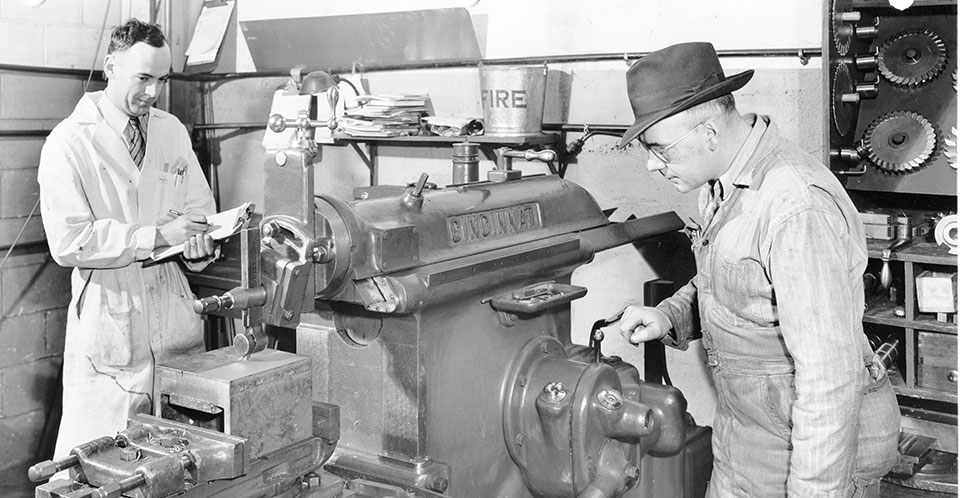Daimler Truck North America was built on a challenge as relevant today as it was when the company was founded more than 70 years ago: build a better vehicle.
In the late 1930s, Leland James, president of Portland, Oregon-based trucking company Consolidated Freightways, approached truck manufacturers with his idea of building truck components with lightweight aluminum instead of traditional steel. Met with resistance and skepticism, James hired a team of engineers and built the vehicles himself.
Featuring a cab-over-engine design, James’ trucks were an immediate success, as they were lightweight, durable, and easy to handle. In 1940, James helped establish Freightways Manufacturing Company in Salt Lake City, UT to produce the vehicles. The manufacturing company changed its name to Freightliner Corporation in 1942, and the company would soon become North America’s leading heavy-duty vehicle manufacturer. Then, with the onset of World War II (and subsequent shortages of aluminum and manpower), operations were converted to wartime production of ship and aircraft parts.

In 1947, Freightliner Corporation resumed truck-building operations at its new manufacturing facility in Portland. Amidst the postwar boom, Portland’s Hyster Company became the first private carrier to order a Freightliner in 1950. Business grew quickly as word spread of Freightliner’s ability to make trucks to customers’ specifications. Production volumes grew from 116 vehicles in 1950, to 931 in 1960, and 6,206 in 1970.
In 1981, Daimler-Benz AG, one of the world’s premier automotive companies and builder of heavy-duty commercial vehicles, purchased Freightliner from Consolidated Freightways. In the next decade, vehicle sales more than doubled. With its vast technological resources, Daimler-Benz helped Freightliner reach the top of the North American heavy-duty truck market by 1992.
The 1990s marked a decade of acquisitions and significant growth. In 1995, Oshkosh Corporation’s chassis division was purchased, becoming Freightliner Custom Chassis Corporation. Freightliner also acquired firefighting/emergency vehicle manufacturer American LaFrance that year. In 1997, it purchased the heavy truck division of Ford Motor Company, launching the Sterling brand soon after. Continuing its acquisition of complementary products as a member of the newly formed DaimlerChrysler, Freightliner acquired school bus manufacturer Thomas Built Buses in 1998. Further growth and diversification continued with the purchase of Western Star Trucks in 2000, and the launch of Unimog North America in 2003.
In 2004, Freightliner LLC opened a full-scale wind tunnel in Portland, marking the first wind tunnel in North America fully designed for, and dedicated to testing full-size commercial vehicles. Freightliner Custom Chassis Corporation introduced their hybrid electric walk-in chassis for the package delivery industry.
In 2007, Daimler sold the majority interest in Chrysler to Cerberus Capital Management, LP, a private-equity company based in New York. This sale allowed Daimler to again focus on the premium vehicle segments represented by the Mercedes-Benz Car Group and the Truck Group, in addition to the important and related Financial Services activities. During this era of continuing focus, the American LaFrance brand was sold (in 2005) and the Sterling brand was retired (in 2009).
The divestiture of Chrysler initiated a name change for our parent company to Daimler AG late in 2007. In 2008, Freightliner LLC became Daimler Truck North America LLC, better reflecting our role in Daimler’s global operation.
Today, Daimler Truck North America is the leading commercial vehicle manufacturer in North America. Our portfolio of distinctive brands serves a multitude of industries and commercial vehicle applications. Through its affiliated companies like Detroit Diesel Corporation, the company also is a leading provider of heavy- and medium-duty diesel engines and components.
As Daimler Truck North America enters its eighth decade, it remains committed to the values on which it was founded: innovation, quality, and an unwavering dedication to meeting customers’ needs.